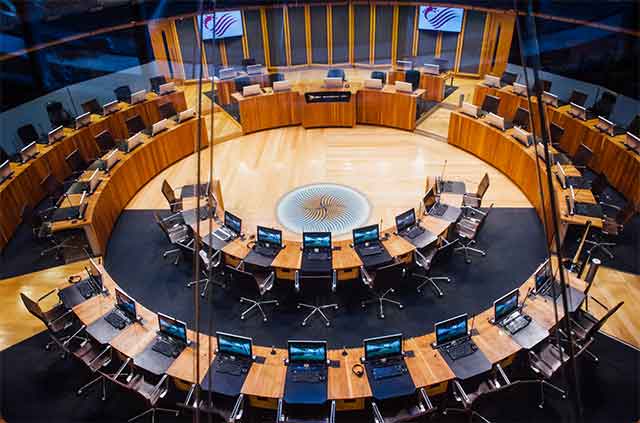Wales faces a housing crisis that is pushing families into absolute despair and leaving children traumatised, the Senedd heard.
Janet Finch-Saunders led a Conservative debate, warning that only 5,787 new homes were completed in 2022-23 – one of the lowest numbers since records began.
The Tories’ shadow housing minister said someone on the average salary would have to spend more than seven times their earnings for an average-priced home at £212,000.
She raised concerns about a rapid increase in demand in the rental market, saying supply has failed to keep up due to Welsh Government reforms of the sector.
Ms Finch-Saunders told the chamber that homelessness has hit record levels, with the number of children in temporary housing reaching more than 3,000 in February 2023.
She added that about 90,000 households are on the social housing waiting list.
“Those figures are unsustainable,” she said. “The cost to mental health and wellbeing is serious. The impact on the lives of many families and children is one of absolute despair.”
‘Trauma’
Ms Finch-Saunders said a family in temporary accommodation told her: “My children will always remember this trauma. This is not an environment where my children should live.”
The Aberconwy MS warned that homelessness and spending on poor accommodation has spiralled out of control, with councils spending £60m last year.
She raised the example of people on the housing waiting list in Cardiff sleeping in an old Toys ‘R’ Us building over Christmas
She asked: “How can any of you allow the people of Wales to live like this?”
The former businesswoman called for a taskforce to tackle the backlog in the slowest performing local authorities and a new planning apprentice post for every council.
She urged ministers to tackle the 103,000 vacant homes and support small developers to build houses on land owned by councils or the Welsh Government.
‘Vicious cycle’
Mabon ap Gwynfor, who is Plaid Cymru’s shadow minister, focused on the interrelated nature of the housing and cost-of-living crises.
He said tens of thousands of people are living in a vicious cycle of housing uncertainty.
Mr Gwynfor told the Senedd: “They are forced to move regularly, they are living in rented accommodation of poor quality, or having to choose between having a roof over their heads or other essentials, such as heating and food.
“This uncertainty and inappropriate housing has a detrimental impact on the physical and mental health of people, which in turn puts huge pressure on the NHS and other budgets.”
The Dwyfor Meirionnydd MS argued the solution is clear: building more social housing at a scale not seen since the 1950s.
He warned that young people will pay the best part of £600,000 at today’s prices for a three-bedroom home over the lifetime of a mortgage.
Cooperatives
Mike Hedges, a Labour backbencher, pointed to the potential role of cooperative housing.
He raised the example of Merthyr Valley Homes tenants voting to create the first tenant and employee mutual housing association in Wales.
Mr Hedges said Cwmpas’ Communities Creating Homes programme offers comprehensive free support tailored to each housing scheme.
He told MSs: “The project is expected to lead to a thriving cooperative and community-led housing sector, which is desperately needed.”
The Swansea East MS also raised concerns about empty properties – “a wasted resource in a time of substantial housing demand”.
The former lecturer and council leader called for compulsory purchase powers for councils when a house or flat has been empty for four to five years.
‘Crisis’
Lee Waters, the deputy minister for climate change, agreed with the Conservatives – at least on the need to build more homes and on some of the barriers.
He said the house building sector has faced significant challenges including supply chain disruption, inflation in material costs, labour shortages after Brexit, and rising interest rates.
Mr Waters accused the UK Government of causing an economic crisis that has made the challenge of building homes all the more difficult.
He stressed that social housing is the Welsh Government’s priority, highlighting the commitment to building 20,000 low-carbon homes in the sector by 2026.
“I believe the case for investing in social housing is as strong as it has ever been,” he said, adding that almost £1.2bn has been allocated to the social housing grant over four years.
He told the chamber £50m has been invested to bring up to 2,000 long-term empty properties back into use, building on the approach in Rhondda Cynon Taf.
The Tory motion was voted down before ministers’ “delete all” amendment was agreed.

